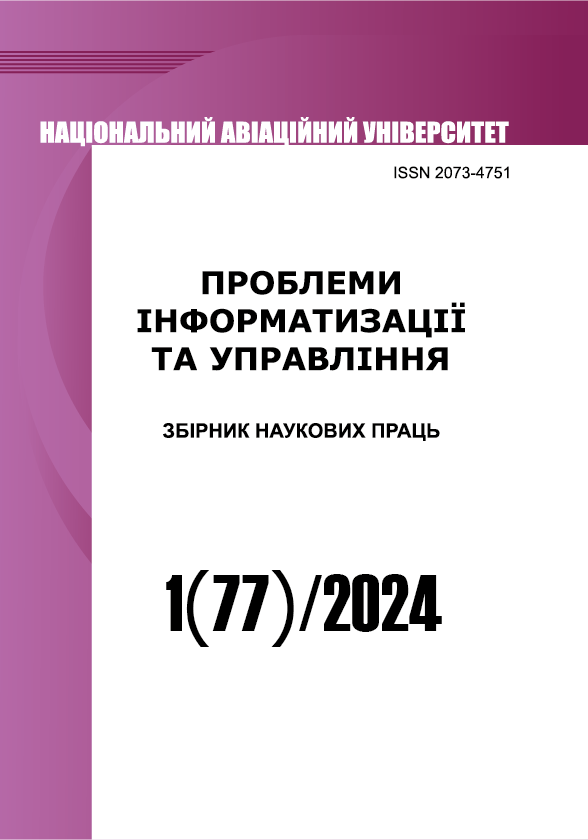Analysis of some well-known models of information spread in social networks in the aspect of information warfare
DOI:
https://doi.org/10.18372/2073-4751.77.18651Keywords:
social network, information dissemination, information influence, distribution modelsAbstract
Social networks have become an almost indispensable source of information and communication in the daily life of millions of people. From the birth of the concept in the 1950s, they have come a long way from defining certain social groups by interests to modern Internet platforms, with the prospect of further development to meta-platforms. With its development, social networks have become the main platform for the distribution of various information and one of the main factors of influence on society during election processes, revolutionary events and military conflicts. In order to conduct an information campaign or defend oneself in social networks, it is necessary to understand the principles of information dissemination in them.
On the basis of the analysis of models of information distribution in social networks, the most key ones have been selected. The following models of information dissemination in social networks are considered in the study: Model of viral distribution (SIR), SEIR model; Independent Cascade model; Wide-Spread Model; Influential Users Model. The results of the analysis made it possible to assess the suitability of these models for solving the problems of managing informational and psychological influence.
References
Палій С. В. Соціальні мережі як засіб комунікації електронного навчання. Управління розвитком складних систем. 2013. №13. С. 152–156.
Медіаспоживання українців в умовах повномасштабної війни. Опитування ОПОРИ. URL: https://www.oporaua.org/polit_ad/mediaspozhivannia-ukrayintsiv-v-umovakh-povnomasshtabnoyi-viini-opituvannia-opori-24068 (дата звернення: 02.02.2024).
Taylor S. J. et al. Identity effects in social media. Nature Human Behaviour. 2023. Vol. 7, no. 1. P. 27–37.
González‐Bailón S., Lelkes Y. Do social media undermine social cohesion? A critical review. Social Issues and Policy Review. 2023. Vol. 17, no. 1. P. 155–180.
Harriger J. A., Thompson J. K., Tiggemann M. TikTok, TikTok, the time is now: Future directions in social media and body image. Body Image. 2023. Vol. 44. P. 222–226.
Paul S., Das S. Investigating information dissemination and citizen engagement through government social media during the COVID-19 crisis. Online Information Review. 2023. Vol. 47, no. 2. P. 316–332.
Shi J. et al. Determinants of users’ information dissemination behavior on social networking sites: An elaboration likelihood model perspective. Internet Research. 2018. Vol. 28, no. 2. P. 393–418.
Prier J. Commanding the trend: Social media as information warfare. Information warfare in the age of cyber conflict / ed. by C. Whyte, A. T. Thrall, B. M. Mazanec. Oxon, 2020. P. 88–113.
Ananthaswamy V., Seethalakshmi B. Mathematical analysis of information dissemination model for social networking services. American Journal of Modeling and Optimization. 2015. Vol. 3, no. 1. P. 26–34.
Dong, J. et al. The analysis of influencing factors of information dissemination on cascade size distribution in social networks. IEEE Access. 2018. Vol. 6. P. 54185–54194.
Zhou F. et al. A survey of information cascade analysis: Models, predictions, and recent advances. ACM Computing Surveys (CSUR). 2021. Vol. 54, no. 2. P. 1–36.
Wang L. et al. Influence spread in geo-social networks: a multiobjective optimization perspective. IEEE Transactions on Cybernetics. 2019. Vol. 51, no. 5. P. 2663–2675.
Базарний С. Метод виявлення агентів соціальних мереж, що мають найбільший вплив. Сучасні інформаційні технології у сфері безпеки та оборони. 2023. №46/1. С. 145–150.
Гізун А., Гріга В. Аналіз сучасних теорій інформаційно-психологічних впливів в аспекті інформаційного протиборства. Безпека інформації. 2016. №22/3. С. 272–282.
Zahran B. et al. Developing an expert system for assessment of information-psychological influence. Indonesian Journal of Electrical Engineering and Computer Science. 2019. Vol. 15, no. 3. P. 1571–1577.
Gizun A. et al. Method of informational and psychological influence evaluation in social networks based on fuzzy logic. 1st International Workshop on Control, Optimisation and Analytical Processing of Social Networks (COAPSN-2019) : proceedings, Lviv, Ukraine, May 16-17, 2019 / Lviv Polytechnic National University. 2019. P. 1–11. URL: https://ceur-ws.org/Vol-2392/paper1.pdf.
Downloads
Published
Issue
Section
License
Автори, які публікуються у цьому журналі, погоджуються з наступними умовами:- Автори залишають за собою право на авторство своєї роботи та передають журналу право першої публікації цієї роботи на умовах ліцензії Creative Commons Attribution License, котра дозволяє іншим особам вільно розповсюджувати опубліковану роботу з обов'язковим посиланням на авторів оригінальної роботи та першу публікацію роботи у цьому журналі.
- Автори мають право укладати самостійні додаткові угоди щодо неексклюзивного розповсюдження роботи у тому вигляді, в якому вона була опублікована цим журналом (наприклад, розміщувати роботу в електронному сховищі установи або публікувати у складі монографії), за умови збереження посилання на першу публікацію роботи у цьому журналі.
- Політика журналу дозволяє і заохочує розміщення авторами в мережі Інтернет (наприклад, у сховищах установ або на особистих веб-сайтах) рукопису роботи, як до подання цього рукопису до редакції, так і під час його редакційного опрацювання, оскільки це сприяє виникненню продуктивної наукової дискусії та позитивно позначається на оперативності та динаміці цитування опублікованої роботи (див. The Effect of Open Access).


